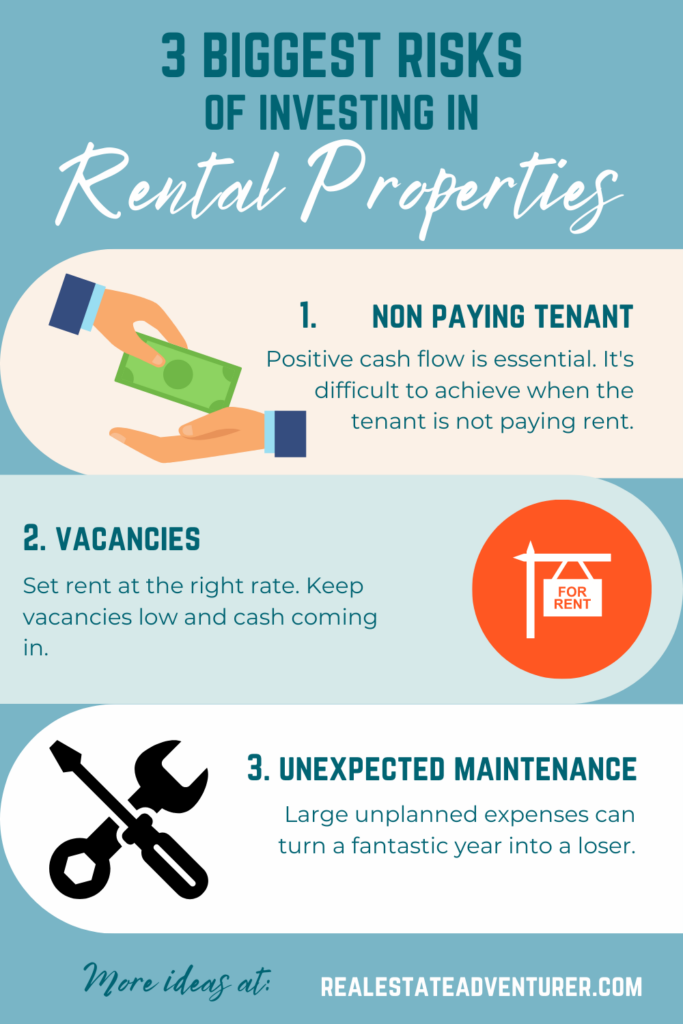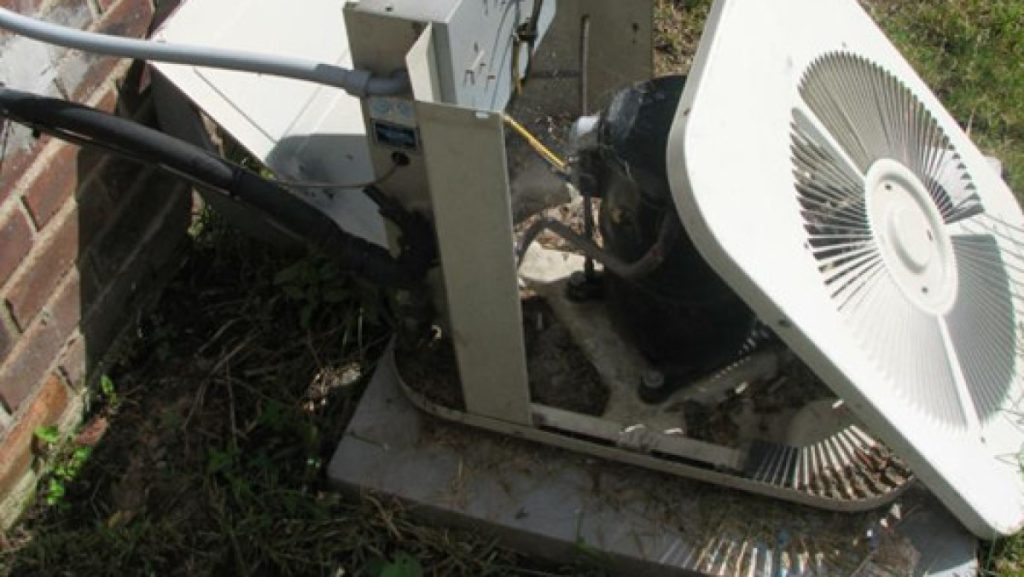There are many advantages to owning rental property, such as having a passive income source, investment diversification, and property appreciation. Owning a portfolio of single-family homes is an excellent way to build long-term wealth, but these investment properties come with risks. Sidestepping these perils takes experience, and this article will show you the biggest risks you will likely encounter when owning rental property and give tips for minimizing the most significant risks.

The biggest risk of owning rental property is having a tenant not paying the rent. A non-paying tenant not only restricts your profit; it impacts your ability to cover expenses and handle your landlord’s legal obligations.
I have been investing in real estate for over a decade and have first-hand experience with all sorts of problems. These problems range from minor nuisances to massive disasters, almost bankrupting me, but I got past each one. Eventually, I figured out how to minimize the potential risks, and now I own a rental property portfolio that runs smoothly and continues to grow. Without further ado, here are the three biggest risks of owning rental property, listed in order.
1. Non Paying Tenants
Positive cash flow is the main goal when investing in residential real estate; for that cash flow, you need a reliable source of monthly rents. As mentioned above, the biggest risk of owning rental property is having a tenant who is not paying their rent. This situation is much worse than having a vacant property because you can’t easily remedy it by finding a tenant. If you can mitigate this risk, it will minimize the impact of the other risks.
Hardships will ensue when you are not deriving an income from your rental property. Without a paying tenant, you are likely to have negative cash flow; that is, more money going out than coming in. When this happens, making your mortgage payments becomes challenging, and you could lose the property. Without rental income, it is difficult to perform property maintenance and pay property taxes, which are legally required for a landlord and property owner.
Without enough money, you will be forced to fund major repairs and other expenses from outside sources. Often you will need to use cash from personal sources to satisfy your obligation to the rental property. If forced to inject too much money from outside sources, you will likely face another set of tribulations. The good news is that we know how to mitigate the risk of a non-paying tenant.
How to Deal with a Tenant that is Not Paying Rent
Avoid tenants that don’t pay: Better tenant screening will help you avoid the problem of a non-paying tenant, but it’s not always clear what to look for in the screening process. If you set the bar too high, you have trouble getting tenants, and if you set it too low, you end up with bad tenants. I have had many tenants with terrible credit, but they always pay their rent on time. The most reliable screening I have used is rejecting tenants with past evictions.
Don’t make it easy to miss a payment: Often, tenants have some money and have to decide which bills they can pay. Some creditors will let them slide a bit, while others are quick to repossess a car or file a legal action. It is easy to let a tenant skip a payment when they have a good reason, but you cannot afford to set this precedent. You must collect the rent, and the reason the tenant didn’t pay is irrelevant. Remember, those who let them slide are the ones who don’t get paid.
Take action quickly: If rent is not paid as agreed, you must begin eviction as soon as your city allows. Make sure you know the legal rules and follow all the steps, but start the process as quickly as possible. This does not preclude you from reaching a deal with the tenant; the eviction can be stopped if the tenant pays. Plus, nothing inspires urgency like the sheriff tacking the notice on the door.
For my rentals, if rent is not received on the due date, I send a letter demanding possession in 5 days. If I haven’t received payment on the sixth day, I start the eviction process, and those fees are added to their balance. If the tenant contacts me in advance, I will give them a couple of days, but if they need to be over ten days late, I file for eviction. Evictions are slow, and you don’t wait weeks to begin a process that tasks weeks. Nonpayers have to go.
2. Vacancies
Excessive vacancies are the second biggest risk when owning rental properties. Having a property that isn’t generating income is a big problem, but income is not the only problem. Vandalism rates are much higher for vacant properties. Over the years, I have had many HVAC units stolen, and it’s never happened at an occupied property.
How to Deal with Vacancies
Don’t procrastinate: The number one reason properties are vacant is that the landlord doesn’t have a sense of urgency when finding tenants. The previous tenants leave, and a few weeks later, the landlord starts to get the property ready; the work drags on for weeks, and when it’s ready, the owner puts out a sign when they happen to be over that way. You must act quickly to fill vacancies. As soon as the tenant leaves, put out your sign and make your for-rent posts. You may find a tenant that doesn’t care about the condition, and at least you will have them lined up when the work is done.
Your rent is too high: You must set a market rent. You can’t reliably get tenants if your rent is above the rate in your real estate market, even if you have extra expenses and need that rent. It doesn’t matter if your house is a prettier color or has a better layout; everything goes for market value. A desirable property may rent for a few dollars more than those around it, but generally, all the properties rent about the same when adjusted for size and bed/bath count. It is okay to set a higher rent to ‘find the market rent”, but you should quickly drop it when there is little interest. An extra vacant month is more costly than missing out on a 10% rent increase.
3. Unexpected Maintenance

Unexpected maintenance is the bane of a landlord’s life. Very few things are worse than getting a call that your HVAC unit needs to be replaced or some other costly repair. Some significant expenses cost more than a year’s rent and may wipe out several years of profit. This is the third biggest risk of owning investment property, so hopefully, you have been holding back money because it will happen eventually.
How to Deal with Unexpected Maintenance
Hold back 40% of the rent for maintenance
These large expenses will eventually happen, but fortunately, this risk is easily mitigated. Academic studies and my own experience show that operating expenses are about 40% of the rent. Covering these significant expenses is as simple as setting aside 40% of monthly rent in a separate account. The balance of this account will become large, but don’t touch it. Over the long term, these unexpected expenses will use the money you stashed there. If you can’t afford to set aside 40% of the rent, then you must have broken the number 1 rule of real estate investing in rental properties: never pay too much for a rental house.
Hire an employee
As your real estate investments grow, you can save maintenance costs by hiring an employee instead of using contractors for each job. Once you have about 50 units, it is more cost-efficient to have a salaried employee perform routine maintenance. Check out my article how when you should hire a handyman.
Reduce vacancies
When a property is vacant, expenses will mount. Often you will need to pay utilities for the vacant properties, while a tenant pays the utilities for occupied properties. Vandalism and theft are significantly higher for vacant properties. Thieves will steal your air conditioning unit, water heater, and even the power meter. You can reduce unexpected maintenance costs by lowering your vacancy rate, and the solution to that is discussed above.
Recoup what you can
When the expense results from a tenant’s damage or neglect, you should charge them for the damages. Don’t be timid when holding back from a security deposit, but don’t unduly deduct money for everyday wear and tear. If you are involved in an eviction, you should also seek a financial judgment for any money owed. Remember that these judgments are notoriously difficult to collect, and it’s probably not worth pursuing a judgment on its own. I have won over a hundred judgments and collected precisely $0. However, asking for a judgment if you are involved in an eviction court action doesn’t hurt.
Why You Must Stay On Top of Maintenance
Rental property owners must stay on top of maintenance to keep their property in good condition and avoid costly repairs. Property prices increase over time, and without routine maintenance, your property values will not align with the housing market. Not only will this affect capital gains, but it will also reduce monthly income, and make it difficult to attract new tenants.
In addition to property values, there are other reasons a rental property business will benefit from promptly handling maintenance issues. Taking care of minor problems quickly can save money and protect a long-term investment. In addition, tenants are more likely to renew their lease when they live in a well-maintained property, reducing vacancies and retaining good tenants.
Conclusion
For real estate investors, owning rental homes can be very lucrative but comes with risks. This article has shown you the biggest risk you will face when owning a rental property investment portfolio. In addition, I have given multiple tips on addressing each of these risks. The best way to mitigate all risks, in general, is to follow the number 1 rule of investing in rental properties – never pay too much for a rental house.




